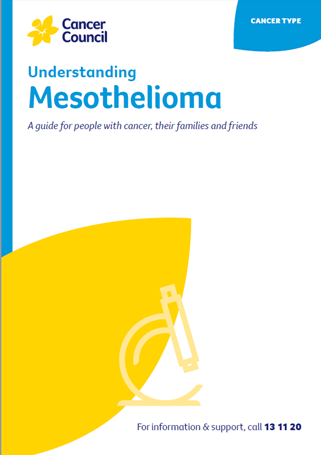Tests for pleural mesothelioma
In this section we discuss the diagnostic tests for pleural mesothelioma.
Learn more about:
Initial tests
Blood tests and x-rays can provide information about your overall health and help to rule out other conditions.
Blood test
You will have blood taken to check your general health and let your doctors know how your blood cells, liver and kidneys are working. This helps them work out your fitness for any treatment.
Mesothelioma does not usually show up on a blood test, but results may show substances (called markers) that are produced by cancer cells.
X-ray
If you have chest symptoms, you may first have a chest x-ray to look for any changes in the lungs, thickening of the pleura, and fluid in the space between the lungs and the chest wall.
If fluid, thickening or other changes are found, you will need more tests to check whether mesothelioma or another condition is the cause.
Mesothelioma does not always show up on an x-ray and can be hidden by other organs within the chest cavity. So let your doctor know if you think you may have been exposed to asbestos so that they can investigate further.
→ READ MORE: CT scan for pleural mesothelioma
Podcast: Tests and Cancer
Listen to more episodes of our podcast for people affected by cancer
More resources
Dr Anthony Linton, Medical Oncologist, Concord Cancer Centre and Concord Repatriation General Hospital, NSW; Dr Naveed Alam, Thoracic Surgeon, St Vincent’s Hospital Melbourne and Monash Medical Centre, VIC; Donatella Arnoldo, Consumer; Polly Baldwin, 13 11 20 Consultant, Cancer Council SA; Dr Melvin (Wee Loong) Chin, Medical Oncologist, Sir Charles Gairdner Hospital and National Centre for Asbestos Related Diseases, WA; Prof Kwun Fong, Thoracic and Sleep Physician and Director, UQ Thoracic Research Centre, The Prince Charles Hospital, and Professor of Medicine, The University of Queensland, QLD; Vicki Hamilton OAM, Consumer and CEO, Asbestos Council of Victoria/GARDS Inc., VIC; Dr Susan Harden, Radiation Oncologist, Peter MacCallum Cancer Centre, VIC; Penny Jacomos, Social Worker, Asbestos Diseases Society of South Australia, SA; Prof Brian Le, Director, Parkville Integrated Palliative Care Service, The Royal Melbourne Hospital and Peter MacCallum Cancer Centre, VIC; Lung Cancer Support Nurses, Lung Foundation Australia; Jocelyn McLean, Mesothelioma Support Coordinator, Asbestos Diseases Research Institute, NSW; Prof David Morris, Peritonectomy Surgeon, St George Hospital and UNSW, NSW; Joanne Oates, Registered Occupational Therapist, Expert Witness in Dust Diseases, and Director, Evaluate, NSW; Chris Sheppard and Adam Barlow, RMB Lawyers.
View the Cancer Council NSW editorial policy.
View all publications or call 13 11 20 for free printed copies.
Need to talk?
Support services
Coping with cancer?
Speak to a qualified health professional someone who has been there, support groups & forum
Looking for transport, accommodation or home help?
Practical advice and support during and after treatment
Cancer information
Peritoneal mesothelioma
Learn about this type of mesothelioma, its symptoms, diagnosis, treatment, and how to manage its symptoms
Patient rights and responsibilities
What you can reasonably expect from your health care providers

